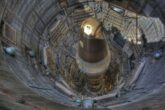May 07, 2015
The Geopolitics of the Iran Nuclear Deal
As the United States and Iran near an historic nuclear agreement there is an intense debate about whether a deal represents capitulation to Iranian interests in the Middle East or an opportunity to help stabilize the region. If the United States and its partners learn the lessons of previous nuclear negotiations with Iran, and pursue a tightly coordinated strategy in the region, there is a potential over the next few years to ameliorate the conflict-ridden Middle East. For the deal itself is only half the challenge: the other half is to craft a geopolitical framework following the deal that constrains Iranian ambitions.
Since early 2009, President Barack Obama pursued a strategy of engagement and pressure with Iran with regards to the nuclear program, consistently offering to negotiate but also applying increasing economic and diplomatic pressure. But Iran refused to comply.
Read the full op-ed at The National Interest.
More from CNAS
-
Indo-Pacific Security / National Security Human Capital Program
Time for US nuclear strategy to embrace no first useNo first use is the most meagre of many measures needed to restrain US presidential authority in the nuclear realm....
By Van Jackson
-
Defense / National Security Human Capital Program
If You Want Peace, Prepare for Nuclear WarIn a little under three decades, nuclear weapons have gone from center stage to a sideshow in U.S. defense strategy. Since the 1990s, the United States has drastically reduced...
By Elbridge Colby
-
National Security Human Capital Program
Trump's nuclear views are terrifying: ColumnThe contours of Donald Trump’s foreign policy are becoming disturbingly clear. Newspapers have labeled his thinking on international affairs "isolationist” and “unabashedly no...
By Mira Rapp-Hooper
-
Defense / National Security Human Capital Program
Elbridge Colby before the House Armed Services Subcommittee on Strategic ForcesElbridge Colby testified before the House Armed Services Subcommittee on Strategic Forces on adapting U.S. nuclear strategy and posture to a more contested and competitive wor...
By Elbridge Colby


